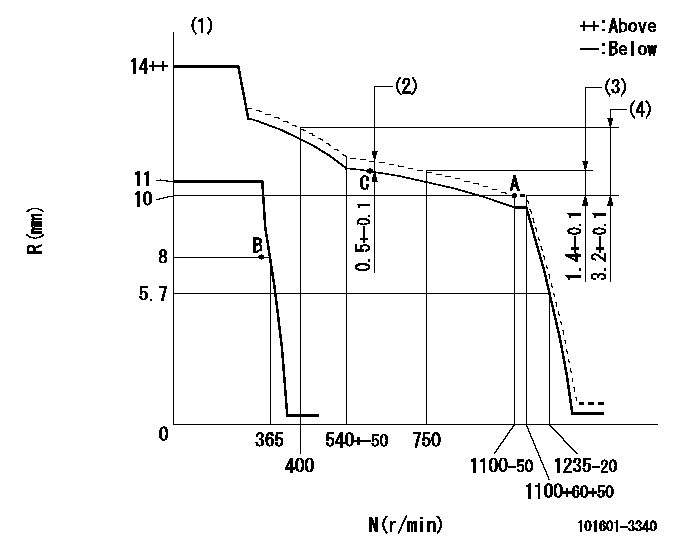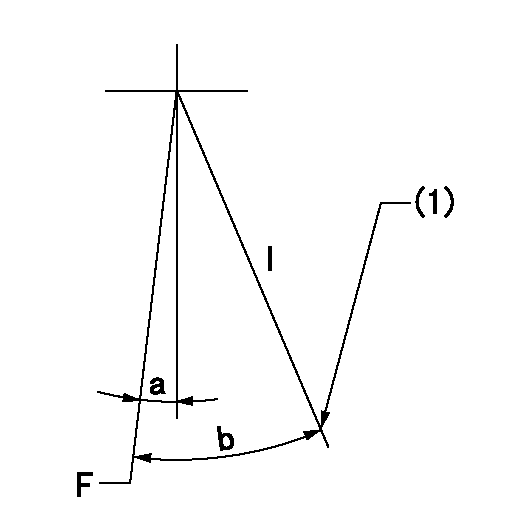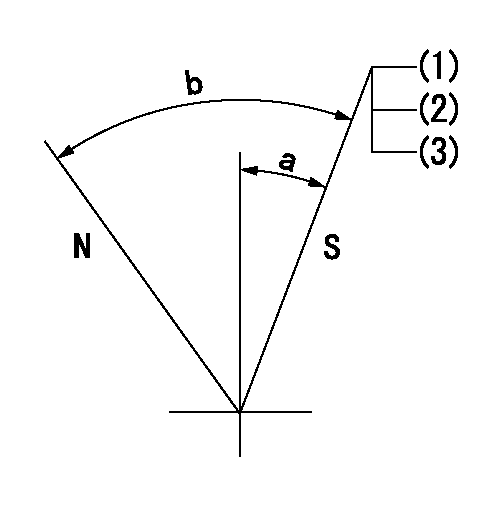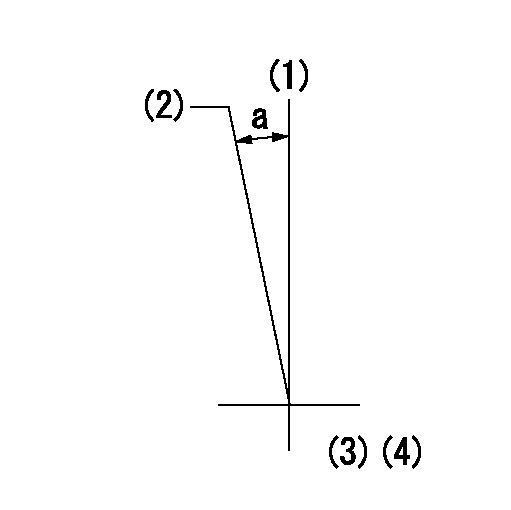Information injection-pump assembly
ZEXEL
101601-3340
1016013340
KOMATSU
6138721980
6138721980

Rating:
Cross reference number
ZEXEL
101601-3340
1016013340
KOMATSU
6138721980
6138721980
Zexel num
Bosch num
Firm num
Name
Calibration Data:
Adjustment conditions
Test oil
1404 Test oil ISO4113 or {SAEJ967d}
1404 Test oil ISO4113 or {SAEJ967d}
Test oil temperature
degC
40
40
45
Nozzle and nozzle holder
105780-8140
Bosch type code
EF8511/9A
Nozzle
105780-0000
Bosch type code
DN12SD12T
Nozzle holder
105780-2080
Bosch type code
EF8511/9
Opening pressure
MPa
17.2
Opening pressure
kgf/cm2
175
Injection pipe
Outer diameter - inner diameter - length (mm) mm 6-2-600
Outer diameter - inner diameter - length (mm) mm 6-2-600
Tester oil delivery pressure
kPa
157
157
157
Tester oil delivery pressure
kgf/cm2
1.6
1.6
1.6
Direction of rotation (viewed from drive side)
Right R
Right R
Injection timing adjustment
Direction of rotation (viewed from drive side)
Right R
Right R
Injection order
1-5-3-6-
2-4
Pre-stroke
mm
4
3.95
4.05
Beginning of injection position
Drive side NO.1
Drive side NO.1
Difference between angles 1
Cal 1-5 deg. 60 59.5 60.5
Cal 1-5 deg. 60 59.5 60.5
Difference between angles 2
Cal 1-3 deg. 120 119.5 120.5
Cal 1-3 deg. 120 119.5 120.5
Difference between angles 3
Cal 1-6 deg. 180 179.5 180.5
Cal 1-6 deg. 180 179.5 180.5
Difference between angles 4
Cyl.1-2 deg. 240 239.5 240.5
Cyl.1-2 deg. 240 239.5 240.5
Difference between angles 5
Cal 1-4 deg. 300 299.5 300.5
Cal 1-4 deg. 300 299.5 300.5
Injection quantity adjustment
Adjusting point
A
Rack position
10
Pump speed
r/min
1100
1100
1100
Average injection quantity
mm3/st.
77
76
78
Max. variation between cylinders
%
0
-2
2
Basic
*
Fixing the lever
*
Boost pressure
kPa
40
40
Boost pressure
mmHg
300
300
Injection quantity adjustment_02
Adjusting point
B
Rack position
8+-0.5
Pump speed
r/min
350
350
350
Average injection quantity
mm3/st.
12.3
11.1
13.5
Max. variation between cylinders
%
0
-10
10
Fixing the rack
*
Boost pressure
kPa
0
0
0
Boost pressure
mmHg
0
0
0
Remarks
Adjust only variation between cylinders; adjust governor according to governor specifications.
Adjust only variation between cylinders; adjust governor according to governor specifications.
Boost compensator adjustment
Pump speed
r/min
650
650
650
Rack position
11.1
Boost pressure
kPa
13.3
9.3
17.3
Boost pressure
mmHg
100
70
130
Boost compensator adjustment_02
Pump speed
r/min
650
650
650
Rack position
11.6
Boost pressure
kPa
26.7
26.7
26.7
Boost pressure
mmHg
200
200
200
Timer adjustment
Pump speed
r/min
750--
Advance angle
deg.
0
0
0
Remarks
Start
Start
Timer adjustment_02
Pump speed
r/min
700
Advance angle
deg.
0.5
Timer adjustment_03
Pump speed
r/min
900
Advance angle
deg.
1.4
0.9
1.9
Timer adjustment_04
Pump speed
r/min
1100
Advance angle
deg.
2.8
2.3
3.3
Timer adjustment_05
Pump speed
r/min
-
Advance angle
deg.
5
4.5
5.5
Remarks
Measure the actual speed, stop
Measure the actual speed, stop
Test data Ex:
Governor adjustment

N:Pump speed
R:Rack position (mm)
(1)Target notch: K
(2)Boost compensator stroke
(3)Rack difference between N = N1 and N = N2
(4)Rack difference between N = N3 and N = N4
----------
K=9 N1=1100r/min N2=750r/min N3=1100r/min N4=400r/min
----------
----------
K=9 N1=1100r/min N2=750r/min N3=1100r/min N4=400r/min
----------
Speed control lever angle

F:Full speed
I:Idle
(1)Stopper bolt setting
----------
----------
a=2deg+-5deg b=27deg+-5deg
----------
----------
a=2deg+-5deg b=27deg+-5deg
Stop lever angle

N:Pump normal
S:Stop the pump.
(1)At shipping
(2)Pump speed aa, rack position bb
(3)Stopper bolt setting
----------
aa=0r/min bb=1-0.2mm
----------
a=21deg+-5deg b=(55deg)
----------
aa=0r/min bb=1-0.2mm
----------
a=21deg+-5deg b=(55deg)
Timing setting

(1)Pump vertical direction
(2)Coupling's key groove position at No 1 cylinder's beginning of injection
(3)-
(4)-
----------
----------
a=(0deg)
----------
----------
a=(0deg)
Information:
The problems in this chart are problems that do come about and are normally called "low power." These problems are not necessarily more common than engine problems, but they are possible problems which you need to read and check before an engine is disassembled.Read all of the items but make sure the first four are checked completely before making any engine test.Recommended Procedure
1. Tachometer Error ... To check, connect a tachometer of known accuracy to the engine. Run the engine and make a comparison of the readings of the vehicle and test tachometers. If vehicle tachometer is bad, make repairs as necessary or install a new tachometer.2. Engine Operated at High Altitude ... Less oxygen at higher altitudes causes the engine horsepower to go down. There is no effect on the 225 horsepower engine for the first 2280 m (7500 ft) above sea level of operation. There is no effect on the 235 and 250 horsepower engines for the first 1524 m (5000 ft) above sea level of operation. See the Fuel Setting And Related Information Fiche for the correct fuel setting for the higher altitude of operation.3. Brakes Do Not Completely Release ... Check the brakes by feeling all the brake drums. If the brakes of a wheel do not completely release, the brake drum for that wheel will be hotter than the brake drums for the other wheels. With the truck lifted with a jack, the wheels must have free rotation when turned by hand.4. Vehicle Operated in Too High a Gear ... If the operator does not shift the truck correctly, or operates the truck in a "lug" condition (using the truck in too high a gear for engine rpm to go up as accelerator pedal is pushed farther down, or using the truck in a gear where engine rpm goes down with accelerator pedal at maximum travel), poor vehicle performance is the result.5. Extra Engine Driven Equipment ... Air compressors, hydraulic pumps, alternators and other engine driven equipment that has damage, or that was not installed correctly, or that is not in correct adjustment can take more horsepower to drive than expected. If necessary, disconnect the equipment and test the engine.6. Speedometer Error ... A bad speedometer does not give the correct speed or the correct indication of fuel consumption. An indication of low speed can cause the operator to feel that he has a power problem.7. Speeds Too High ... The need for more horsepower is easy to see as the speed of the vehicle is increased. This is especially true if the front of the vehicle has a large surface area. Application personnel can give you the horsepower necessary for different vehicle designs at different speeds.8. Overload on Vehicle ... Application personnel can give you the horsepower needs for different vehicles.9. High Moving Resistance ... Soft ground conditions cause a need for more horsepower. To see if the problem is the engine, test the vehicle on a surface known to be
1. Tachometer Error ... To check, connect a tachometer of known accuracy to the engine. Run the engine and make a comparison of the readings of the vehicle and test tachometers. If vehicle tachometer is bad, make repairs as necessary or install a new tachometer.2. Engine Operated at High Altitude ... Less oxygen at higher altitudes causes the engine horsepower to go down. There is no effect on the 225 horsepower engine for the first 2280 m (7500 ft) above sea level of operation. There is no effect on the 235 and 250 horsepower engines for the first 1524 m (5000 ft) above sea level of operation. See the Fuel Setting And Related Information Fiche for the correct fuel setting for the higher altitude of operation.3. Brakes Do Not Completely Release ... Check the brakes by feeling all the brake drums. If the brakes of a wheel do not completely release, the brake drum for that wheel will be hotter than the brake drums for the other wheels. With the truck lifted with a jack, the wheels must have free rotation when turned by hand.4. Vehicle Operated in Too High a Gear ... If the operator does not shift the truck correctly, or operates the truck in a "lug" condition (using the truck in too high a gear for engine rpm to go up as accelerator pedal is pushed farther down, or using the truck in a gear where engine rpm goes down with accelerator pedal at maximum travel), poor vehicle performance is the result.5. Extra Engine Driven Equipment ... Air compressors, hydraulic pumps, alternators and other engine driven equipment that has damage, or that was not installed correctly, or that is not in correct adjustment can take more horsepower to drive than expected. If necessary, disconnect the equipment and test the engine.6. Speedometer Error ... A bad speedometer does not give the correct speed or the correct indication of fuel consumption. An indication of low speed can cause the operator to feel that he has a power problem.7. Speeds Too High ... The need for more horsepower is easy to see as the speed of the vehicle is increased. This is especially true if the front of the vehicle has a large surface area. Application personnel can give you the horsepower necessary for different vehicle designs at different speeds.8. Overload on Vehicle ... Application personnel can give you the horsepower needs for different vehicles.9. High Moving Resistance ... Soft ground conditions cause a need for more horsepower. To see if the problem is the engine, test the vehicle on a surface known to be